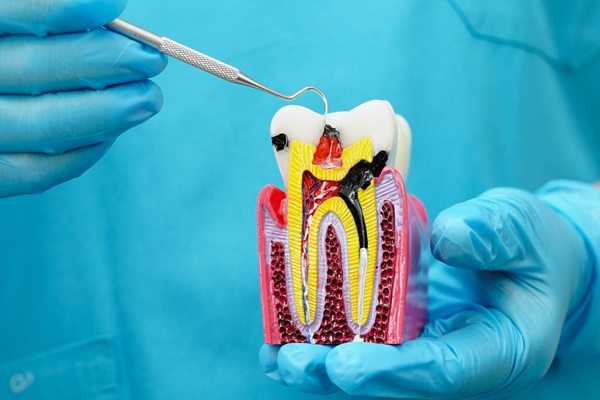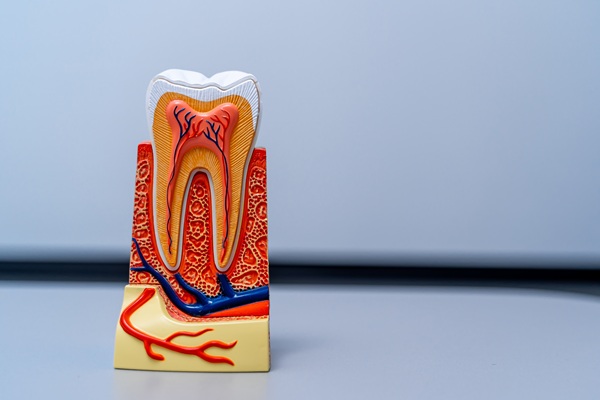What Is Endodontic Surgery?

For a proper understanding of endodontic surgery, knowing about the non-surgical endodontic treatment procedure, or root canal, is essential. A root canal is imperative when the infection or inflammation invades the delicate internal tissues of the tooth, called the pulp. This may be caused by severe tooth decay, repeated dental treatments or trauma to the tooth.
Endodontic treatment is set to remove necrotic or damaged pulp, after which the tooth canal will be cleaned and filled up to keep the tooth intact. In some cases, the nonsurgical endodontic procedure may not be enough to save the tooth, so the dentist or endodontist may suggest endodontic surgery.
Cases that require endodontic surgery include:
- Cracked roots
- Persistent cysts
- Regularly blocked root tips
- Acute pain
- The need to clean up residue from a previous root canal treatment
- Perforated root tips
- Abnormally formed tooth with poorly structured roots
That is not all …
Surgery may be necessary for diagnosis. If you are dealing with specific symptoms, but no issues show up on X-ray scans, there may be a little crack on the tooth or canal that is not immediately obvious with nonsurgical treatment. In such instances, the endodontist may perform surgery to check the tooth root, detect the problem and recommend treatment.
Sometimes, calcium deposits can shrink the canal to the point where it is hard for cleaning and shaping instruments used in the nonsurgical procedure to access the root of the tooth. If calcification occurs inside the tooth, endodontic surgery may be the only way to clean and close the rest of the canal.
Typically, after a root canal treatment, the tooth should be good for a lifetime and never require additional endodontic surgery. Yet, in rare cases, the tooth may not heal and soon become painful or infected within months or years after the first treatment. In this cases, endodontic surgery may be the tooth saver.
Surgery can also be necessary when there are damages to the root surfaces of nearby bones.
Apicoectomy
Although there are many surgeries to save the tooth, the most common endodontic surgery is apicoectomy or root-end resection. Apicoectomy is often recommended when inflammation or infection occurs on the bony part located at the base of the tooth following a root canal treatment.
Apicoectomy entails dissecting the gum tissues close to the toot to reveal the bone beneath and eliminating any infected or inflamed tissue. The procedure also includes removing the tail end of the root.
The endodontist or oral surgeon may place a small filling to close the tail end of the root canal. Stitches or sutures in the gum will ensure that the tissue heals completely. With time, the bone will heal around the root, and the tooth will be fully restored.
In conclusion
Other endodontic surgery includes repairing a damaged root, splitting a tooth in half or extracting one or more roots. The endodontist will enlighten you on the particular type of surgery you need. The procedures are primarily aimed at saving the tooth from extraction.
Request an appointment here: https://santarosaendodontics.com or call Santa Rosa Endodontics at (707) 706-2143 for an appointment in our Santa Rosa office.
Check out what others are saying about our services on Yelp: Read our Yelp reviews.
Recent Posts
Root canal treatment is often the first line of defense for treating teeth with compromised pulp chambers. The pulp chamber is the innermost layer of a tooth, and it stores nerves, blood vessels, and connective tissues. The chamber is sealed off from the rest of the tooth to protect it against bacteria and other irritants…
A root canal can preserve and strengthen a severely damaged or infected tooth. When seeing a root canal dentist, asking informed questions can provide clarity, ease concerns, and improve treatment outcomes. Understanding the procedure helps make the experience more comfortable and ensures you are well-prepared for each step.While each patient's situation is unique, the following…
A person might need to see an endodontist for a wide variety of problems, mainly relating to how they can save patients’ teeth. All endodontists are dentists because they have completed dental school, but they do two more years of specialized study in the techniques used to preserve a person’s dentition. So, if you are…
When a root canal fails, a root canal retreatment must happen. Getting a root canal treatment is better than a dental extraction. If an endodontist sees that your tooth still has good bone support and healthy gums under or around it, a root canal can save the tooth. A root canal is a less expensive…


